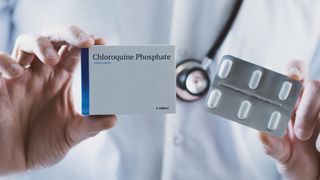
Antimalarial drug confirmed effective on COVID-19
Source: Xinhua| 2020-02-17 21:07:01|Editor: huaxia
BEIJING, Feb. 17 (Xinhua) -- Chinese experts, based on the result of clinical trials, have confirmed that Chloroquine Phosphate, an antimalarial drug, has a certain curative effect on the novel coronavirus disease (COVID-19), a Chinese official said here Monday.
The experts have "unanimously" suggested the drug be included in the next version of the treatment guidelines and applied in wider clinical trials as soon as possible, Sun Yanrong, deputy head of the China National Center for Biotechnology Development under the Ministry of Science and Technology (MOST), said at a press conference.
Chloroquine Phosphate, which has been used for more than 70 years, was selected from tens of thousands of existing drugs after multiple rounds of screening, Sun said.
According to her, the drug has been under clinical trials in over 10 hospitals in Beijing, as well as in south China's Guangdong Province and central China's Hunan Province, and has shown fairly good efficacy.
In the trials, the groups of patients who had taken the drug have shown better indicators than their parallel groups, in abatement of fever, improvement of CT images of lungs, the percentage of patients who became negative in viral nucleic acid tests and the time they need to do so, she said.
Patients taking the drug also take a shorter time to recover, she added.
Sun gave an example of a 54-year-old patient in Beijing, who was admitted to hospital four days after showing symptoms. After taking the drug for a week, he saw all indicators improve and the nucleic acid turn negative.
So far, no obvious serious adverse reactions related to the drug have been found among the over 100 patients enrolled in the clinical trials, she said.
On Feb. 15, several departments including the MOST, the National Health Commission and the National Medical Products Administration called a video conference to listen to drug research and clinical experts' opinions on the drug's efficacy on COVID-19.
The expert team, led by Zhong Nanshan, a renowned respiratory specialist and an academician of the Chinese Academy of Engineering, agreed that Chloroquine Phosphate can be used to treat more COVID-19 patients, Sun said.
Previous in vitro experiments showed that it can block virus infections by changing the acidity and basicity value inside the cell and interfering receptors of SARS coronavirus.
It also shows immune-modulating activity, which may enhance its antiviral effect in vivo and is widely distributed in the whole body, including the lungs, after oral administration.
Chloroquine is a medication used to prevent and to treat malaria in areas where malaria is known to be sensitive to its effects.[1] Certain types of malaria, resistant strains, and complicated cases typically require different or additional medication.[1] Occasionally it is used for amebiasis that is occurring outside the intestines, rheumatoid arthritis, and lupus erythematosus.[1] It is taken by mouth.[1] It is also being studied to treat COVID-19 as of 2020.[2]
Common side effects include muscle problems, loss of appetite, diarrhea, and skin rash.[1] Serious side effects include problems with vision, muscle damage, seizures, and low blood cell levels.[1] It appears to be safe for use during pregnancy.[1][3] Chloroquine is a member of the drug class 4-aminoquinoline.[1] It works against the asexual form of malaria inside the red blood cell.[1]
Chloroquine was discovered in 1934 by Hans Andersag.[4][5] It is on the World Health Organization's List of Essential Medicines, the medicines needed in a health system that are considered to be the safest and most effective.[6] It is available as a generic medication.[1] The wholesale cost in the developing world is about US$0.04.[7] In the United States, it costs about US$5.30 per dose.[1
Indonesia produces anti-malaria drug chloroquine to treat Covid-19
THE STAR
INDONESIA
Tuesday, 24 Mar 20209:32 AM MYT

A lab technician handles coronavirus test samples at Mayo Clinic Laboratories in Rochester, Minnesota. - AFP
JAKARTA (The Jakarta Post/ANN): President Joko 'Jokowi' Widodo said on Monday (March 23) that Indonesia secured a supply of chloroquine, an anti-malaria drug being tested as a possible form of treatment for Covid-19, as countries scramble to stock drugs and medical supplies to fight the disease.
Jokowi said state-owned pharmaceutical company PT Kimia Farma produced the drug, which is extracted from the cinchona tree, a common plant in the country.
“There is neither a cure nor an antivirus to Covid-19, but in drawing from the experiences of countries, chloroquine can be used to help patients recover from disease, ” he said while inspecting the Asian Games athletes village in Kemayoran, Central Jakarta, which has been turned into a special hospital to treat Covid-19 patients.
Jokowi said the drug would not be available at drug stores because it could only be prescribed by a doctor. The government, he claimed, had secured 3 million chloroquine tablets that would be available at hospitals.
Chloroquine, commonly used to treat malaria, was recommended by China, which claimed it was effective in fighting the disease. The United States is testing chloroquine to determine whether it is suitable for treatment.
The drug is still under clinical trial at the World Health Organization, along with anti-flu drug favipiravir, also known as Avigan; a combination of two HIV drugs, lopinavir and ritonavir; and the Ebola drug remdesivir.
Keri Lestari, a professor at Padjadjaran University’s pharmacology and clinical pharmacy department, said Indonesia imported chloroquine phosphate as a raw material to produce the anti-malaria medicine, but it was not impossible to produce the drug with all local materials.
“We can produce the drug from a similar material called quinine sulphate, ” she told The Jakarta Post, stressing that more studies were needed to assess its effectiveness.
Keri said the government should tap into the possibility of producing the drug using only local materials given the global drug scarcity.
“We have the laboratories at Padjadjaran University, Airlangga University and IPB University to conduct the necessary tests, ” she said. - The Jakarta Post/Asia News Network







